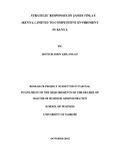| dc.description.abstract | This study was conducted to find out the strategic responses employed by James Finlay Kenya Limited to counter competition in the market and how effective these strategies are. This research was motivated by the fact that tea and horticulture were the leading foreign exchange earners in Kenya in 2010. It therefore follows that firms in these industries must have adopted very successful strategies and more so those with interests in both tea and flowers like James Finlay Kenya Limited. Since the liberalization of the tea and flower sectors, many players have entered the market. Most players are involved in one or more stages of the value chain. Some of these stages include growing, processing, blending, packing, logistics and marketing. A few players participate in all these stages thus must seek partnership or outsource that stage.
A case study approach was chosen as it enables a focused and detailed study. Primary data was collected through interviews with selected managers. The interview guide had different sections. The first section sought the respondent profile while the second sought the challenges faced by the company. The third section was about strategic responses used by the firm with emphasis on four chosen strategies; diversification, vertical integration, research and innovation and certification. The last section was about how successful the strategic responses had been. Secondary data was collected from published industry sources and in house magazines.
The data collected was analyzed using content analysis. From the data, it emerged that the firm has adopted successful strategies that has enabled it to compete successfully in the Kenyan market. It also emerged that there is a benefit in diversifying to a
x
related field and keeping abreast of the latest technological developments through research. In order to ensure stability and continuity, vertical integration is important. Though this process requires huge capital outlay, it pays in the long run. As international customers are most of the time discerning and seek assurance that the goods they consume have been produced ethically, it becomes necessary to seek international standards and certification by relevant bodies like the Rain Forest Alliance and Fair-trade Association. The market is dynamic and those which will remain relevant are those which will continuously innovate.
This study has useful recommendations for various stakeholders. It is the implementation of these recommendations that will give value to the study. The government as the regulator should aim at creating an enabling legal environment for industry to thrive. The tea and flower industries are very critical as they earn a lot of necessary foreign exchange. | en |

